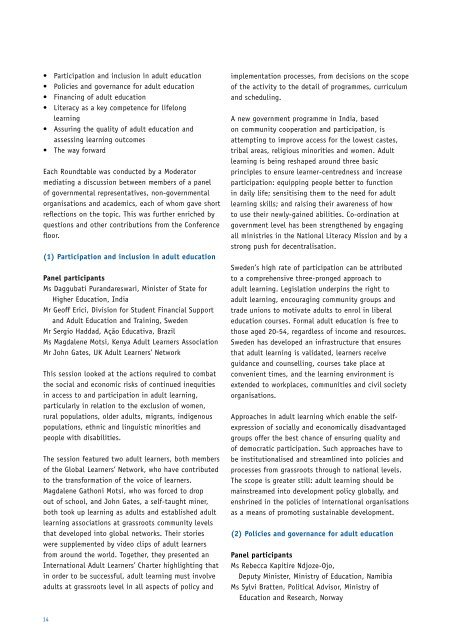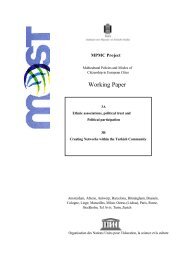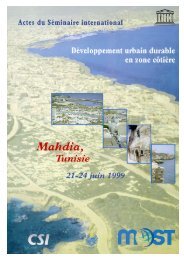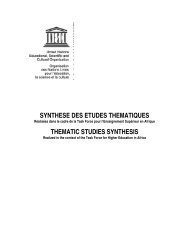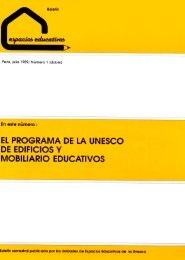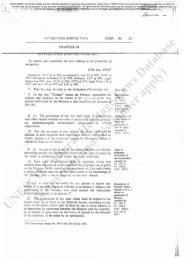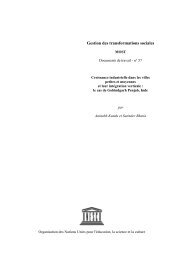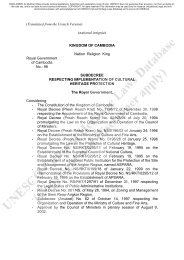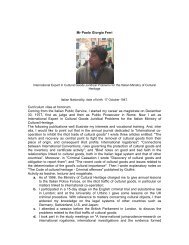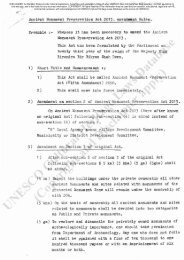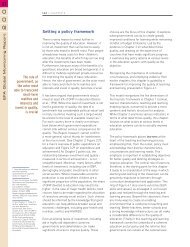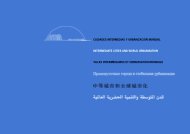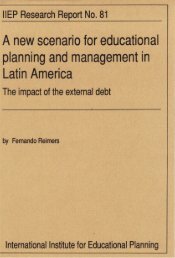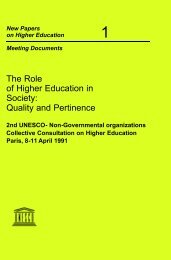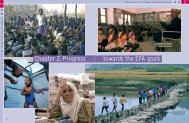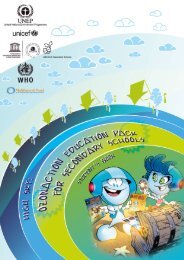CONFINTEA VI, final report - Unesco
CONFINTEA VI, final report - Unesco
CONFINTEA VI, final report - Unesco
You also want an ePaper? Increase the reach of your titles
YUMPU automatically turns print PDFs into web optimized ePapers that Google loves.
• Participation and inclusion in adult education<br />
• Policies and governance for adult education<br />
• Financing of adult education<br />
• Literacy as a key competence for lifelong<br />
learning<br />
• Assuring the quality of adult education and<br />
assessing learning outcomes<br />
• The way forward<br />
Each Roundtable was conducted by a Moderator<br />
mediating a discussion between members of a panel<br />
of governmental representatives, non-governmental<br />
organisations and academics, each of whom gave short<br />
reflections on the topic. This was further enriched by<br />
questions and other contributions from the Conference<br />
floor.<br />
(1) Participation and inclusion in adult education<br />
Panel participants<br />
Ms Daggubati Purandareswari, Minister of State for<br />
Higher Education, India<br />
Mr Geoff Erici, Division for Student Financial Support<br />
and Adult Education and Training, Sweden<br />
Mr Sergio Haddad, Ação Educativa, Brazil<br />
Ms Magdalene Motsi, Kenya Adult Learners Association<br />
Mr John Gates, UK Adult Learners’ Network<br />
This session looked at the actions required to combat<br />
the social and economic risks of continued inequities<br />
in access to and participation in adult learning,<br />
particularly in relation to the exclusion of women,<br />
rural populations, older adults, migrants, indigenous<br />
populations, ethnic and linguistic minorities and<br />
people with disabilities.<br />
The session featured two adult learners, both members<br />
of the Global Learners’ Network, who have contributed<br />
to the transformation of the voice of learners.<br />
Magdalene Gathoni Motsi, who was forced to drop<br />
out of school, and John Gates, a self-taught miner,<br />
both took up learning as adults and established adult<br />
learning associations at grassroots community levels<br />
that developed into global networks. Their stories<br />
were supplemented by video clips of adult learners<br />
from around the world. Together, they presented an<br />
International Adult Learners’ Charter highlighting that<br />
in order to be successful, adult learning must involve<br />
adults at grassroots level in all aspects of policy and<br />
14<br />
implementation processes, from decisions on the scope<br />
of the activity to the detail of programmes, curriculum<br />
and scheduling.<br />
A new government programme in India, based<br />
on community cooperation and participation, is<br />
attempting to improve access for the lowest castes,<br />
tribal areas, religious minorities and women. Adult<br />
learning is being reshaped around three basic<br />
principles to ensure learner-centredness and increase<br />
participation: equipping people better to function<br />
in daily life; sensitising them to the need for adult<br />
learning skills; and raising their awareness of how<br />
to use their newly-gained abilities. Co-ordination at<br />
government level has been strengthened by engaging<br />
all ministries in the National Literacy Mission and by a<br />
strong push for decentralisation.<br />
Sweden’s high rate of participation can be attributed<br />
to a comprehensive three-pronged approach to<br />
adult learning. Legislation underpins the right to<br />
adult learning, encouraging community groups and<br />
trade unions to motivate adults to enrol in liberal<br />
education courses. Formal adult education is free to<br />
those aged 20-54, regardless of income and resources.<br />
Sweden has developed an infrastructure that ensures<br />
that adult learning is validated, learners receive<br />
guidance and counselling, courses take place at<br />
convenient times, and the learning environment is<br />
extended to workplaces, communities and civil society<br />
organisations.<br />
Approaches in adult learning which enable the selfexpression<br />
of socially and economically disadvantaged<br />
groups offer the best chance of ensuring quality and<br />
of democratic participation. Such approaches have to<br />
be institutionalised and streamlined into policies and<br />
processes from grassroots through to national levels.<br />
The scope is greater still: adult learning should be<br />
mainstreamed into development policy globally, and<br />
enshrined in the policies of international organisations<br />
as a means of promoting sustainable development.<br />
(2) Policies and governance for adult education<br />
Panel participants<br />
Ms Rebecca Kapitire Ndjoze-Ojo,<br />
Deputy Minister, Ministry of Education, Namibia<br />
Ms Sylvi Bratten, Political Advisor, Ministry of<br />
Education and Research, Norway


